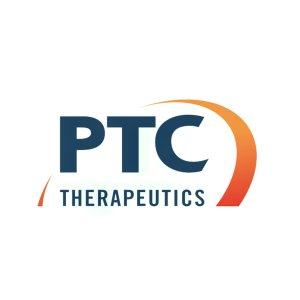Upstaza™ Granted Marketing Authorization by European Commission as First Disease-Modifying Treatment for AADC Deficiency
Rhea-AI Summary
PTC Therapeutics announced the European Commission's approval of Upstaza™ (eladocagene exuparvovec), the first gene therapy for aromatic L-amino acid decarboxylase (AADC) deficiency, applicable in all EU member states and select countries. This therapy is significant for patients aged 18 months and older, offering a disease-modifying treatment option. Clinical trials showed substantial improvements in motor and cognitive skills in treated patients. CEO Stuart W. Peltz emphasized the therapy's potential impact on the quality of life for patients suffering from this severe genetic disorder.
Positive
- Upstaza approved as the first disease-modifying therapy for AADC deficiency.
- Clinical trials showed significant improvements in developmental motor milestones within three months.
- Treatment offers hope to patients with no previous effective options.
Negative
- Sales performance and financial impact from the therapy's launch remain uncertain.
- Ongoing risks associated with regulatory approvals and market acceptance.
News Market Reaction 1 Alert
On the day this news was published, PTCT gained 0.63%, reflecting a mild positive market reaction.
Data tracked by StockTitan Argus on the day of publication.
- PTC Therapeutics to launch first gene therapy directly administered into the brain -
SOUTH PLAINFIELD, N.J., July 20, 2022 /PRNewswire/ -- PTC Therapeutics, Inc. (NASDAQ: PTCT) today announced that Upstaza™ (eladocagene exuparvovec) was granted marketing authorization by the European Commission. Upstaza is the first approved disease-modifying treatment for aromatic L-amino acid decarboxylase (AADC) deficiency and the first marketed gene therapy directly infused into the brain. It is approved for patients 18 months and older.
"Today's approval from the European Commission for Upstaza for the treatment of AADC deficiency is momentous for patients, for PTC, as well as for the larger gene therapy community," said Stuart W. Peltz, Ph.D., Chief Executive Officer, PTC Therapeutics. "We are proud to bring this innovative therapy to the marketplace so that patients may benefit. Upstaza is the first and only approved disease-modifying treatment for patients living with AADC deficiency. We are ready to deliver this long-awaited treatment to patients as soon as possible."
During Upstaza clinical studies, patients went from not achieving any developmental motor milestones to demonstrating clinically meaningful motor skills from as early as three months following treatment, with transformational improvements shown to continue up to ten years after treatment. In addition, cognitive skills improved in all treated patients.1,2 Upstaza also reduced symptoms that cause potentially life-threatening and morbid complications.
"Before treatment, our daughter had not met any development milestones. She suffered from oculogyric crises that evolved into hours of pain, and we were told she would be bedridden for life," said patient organization Teach RARE founder, Richard Poulin, whose daughter was treated as part of a clinical trial. "After receiving Upstaza, she is now speaking, walking, running, and even riding horses. We're thrilled with the EMA approval and the hope that this milestone brings to other children and families impacted by AADC deficiency."
The marketing authorization is applicable to all 27 European Union member states, as well as Iceland, Norway and Liechtenstein.
Upstaza is a one-time gene replacement therapy indicated for the treatment of patients aged 18 months and older with a clinical, molecular, and genetically confirmed diagnosis of aromatic L‑amino acid decarboxylase (AADC) deficiency with a severe phenotype. It is a recombinant adeno-associated virus serotype 2 (AAV2)-based gene therapy, containing the human DDC gene.1 It is designed to correct the underlying genetic defect, by delivering a functioning DDC gene directly into the putamen, increasing the AADC enzyme and restoring dopamine production.2,3
The efficacy and safety profile of Upstaza has been demonstrated across clinical trials and compassionate use programs.1 The first patient was dosed in 2010. In clinical trials, Upstaza demonstrated transformational neurological improvements. The most common side effects were initial insomnia, irritability and dyskinesia.
Administration of Upstaza occurs through a stereotactic surgical procedure, a minimally invasive neurosurgical procedure used for the treatment of a number of pediatric and adult neurological disorders. The Upstaza administration procedure is performed by a qualified neurosurgeon in centers specialized in stereotactic neurosurgery.
AADC deficiency is a fatal, rare genetic disorder that typically causes severe disability and suffering from the first months of life, affecting every aspect of life – physical, mental and behavioral. The suffering of children with AADC deficiency may be exacerbated by: episodes of distressing seizure-like oculogyric crises causing the eyes to roll up in the head, frequent vomiting, behavioral problems, and difficulty sleeping.
The lives of affected children are severely impacted and shortened. Ongoing physical, occupational and speech therapy, and interventions, including surgery, also are often required to manage potentially life-threatening complications such as infections, severe feeding and breathing problems.
PTC is a science-driven, global biopharmaceutical company focused on the discovery, development and commercialization of clinically differentiated medicines that provide benefits to patients with rare disorders. PTC's ability to innovate to identify new therapies and to globally commercialize products is the foundation that drives investment in a robust and diversified pipeline of transformative medicines. PTC's mission is to provide access to best-in-class treatments for patients who have little to no treatment options. PTC's strategy is to leverage its strong scientific and clinical expertise and global commercial infrastructure to bring therapies to patients. PTC believes this allows it to maximize value for all its stakeholders. To learn more about PTC, please visit us at www.ptcbio.com and follow us on Facebook, Instagram, LinkedIn and Twitter at @PTCBio.
Investors:
Kylie O'Keefe
+1 (908) 300-0691
kokeefe@ptcbio.com
Media:
Jeanine Clemente
+1 (908) 912-9406
jclemente@ptcbio.com
This press release contains forward-looking statements within the meaning of The Private Securities Litigation Reform Act of 1995. All statements contained in this release, other than statements of historic fact, are forward-looking statements, including statements regarding: the future expectations, plans and prospects for PTC, including with respect to the expected timing of clinical trials and studies, availability of data, regulatory submissions and responses and other matters; expectations with respect to Upstaza, including the timing of commercial availability; PTC's expectations with respect to the licensing, regulatory submissions and commercialization of its other products and product candidates; PTC's strategy, future operations, future financial position, future revenues, projected costs; and the objectives of management. Other forward-looking statements may be identified by the words, "guidance", "plan," "anticipate," "believe," "estimate," "expect," "intend," "may," "target," "potential," "will," "would," "could," "should," "continue," and similar expressions.
PTC's actual results, performance or achievements could differ materially from those expressed or implied by forward-looking statements it makes as a result of a variety of risks and uncertainties, including those related to: the outcome of pricing, coverage and reimbursement negotiations with third party payors for PTC's products or product candidates that PTC commercializes or may commercialize in the future; expectations with respect to Upstaza and other programs within PTC's gene therapy platform, including potential commercialization, any regulatory submissions and potential approvals, manufacturing capabilities and the potential financial impact and benefits of its leased biologics manufacturing facility and the potential achievement of development, regulatory and sales milestones and contingent payments that PTC may be obligated to make; significant business effects, including the effects of industry, market, economic, political or regulatory conditions; changes in tax and other laws, regulations, rates and policies; the eligible patient base and commercial potential of PTC's products and product candidates; PTC's scientific approach and general development progress; and the factors discussed in the "Risk Factors" section of PTC's most recent Annual Report on Form 10-K, as well as any updates to these risk factors filed from time to time in PTC's other filings with the SEC. You are urged to carefully consider all such factors.
As with any pharmaceutical under development, there are significant risks in the development, regulatory approval, and commercialization of new products. There are no guarantees that any product will receive or maintain regulatory approval in any territory, or prove to be commercially successful, including Upstaza.
The forward-looking statements contained herein represent PTC's views only as of the date of this press release and PTC does not undertake or plan to update or revise any such forward-looking statements to reflect actual results or changes in plans, prospects, assumptions, estimates or projections, or other circumstances occurring after the date of this press release except as required by law.
References:
- Tai CH, et al. Long-term efficacy and safety of eladocagene exuparvovec in patients with AADC deficiency. Mol Ther. 2022;30(2):509-518.
- Chien et al. AGIL-AADC gene therapy results in sustained improvements in motor and developmental milestones through 5 years in children with AADC deficiency. Poster presented at the 48th Annual Meeting of the Child Neurology Society, Charlotte, NC, USA, Oct 23-26, 2019.
- Chien YH, et al. Efficacy and safety of AAV2 gene therapy in children with aromatic L-amino acid decarboxylase deficiency: an open-label, phase 1/2 trial. Lancet Child Adolesc Health. 2017;1(4):265-273.
![]() View original content to download multimedia:https://www.prnewswire.com/news-releases/upstaza-granted-marketing-authorization-by-european-commission-as-first-disease-modifying-treatment-for-aadc-deficiency-301589884.html
View original content to download multimedia:https://www.prnewswire.com/news-releases/upstaza-granted-marketing-authorization-by-european-commission-as-first-disease-modifying-treatment-for-aadc-deficiency-301589884.html
SOURCE PTC Therapeutics, Inc.







